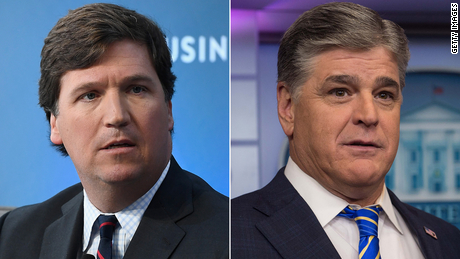This is not Piers Morgan's first controversial moment

London (CNN Business)Piers Morgan has always divided TV audiences, but he gained new notoriety this month after taking on the Duchess of Sussex. With two combative UK media outlets about to launch, that could help him land his next job.
The host of “Good Morning Britain” abruptly left the show from broadcaster ITV last week after questioning whether Meghan Markle was being truthful when she told Oprah Winfrey that she had suicidal thoughts before stepping back from her duties as a member of the Royal family.
Morgan’s comments sparked a backlash and triggered an investigation by Ofcom, the country’s media regulator, which received a record 57,100 complaints about his remarks. But in all likelihood, Morgan won’t be off the air for long.
Two new UK media ventures — former BBC host Andrew Neil’s GB News and Rupert Murdoch’s News UK TV — are preparing to launch. They’re expected to replicate the contentious and personality-driven political discussions that dominate US cable and talk radio, but are largely absent from British television.
And Morgan, a high-profile and outspoken critic of “woke” culture, would be a natural fit.
“He’s certainly someone who generates publicity,” said Patrick Barwise, co-author of the book “The War Against the BBC” and emeritus professor of management and marketing at London Business School. “He would fit that model very well.”
Morgan’s next move
In a recent interview on the BBC, Neil said that Morgan “would be a huge asset to GB News,” and that he’d be “delighted” to talk with him if he’s interested.
“Could we find a role for Piers Morgan? Of course we could,” said Neil, who is the network’s founding chairman. “Any network worth its salt could find a role for a broadcaster of his caliber.”
Murdoch’s News UK TV declined to comment on whether it had made the former tabloid newspaper editor an offer.
Morgan is fanning gossip about his next move, which includes speculation that he could land in the United States. When The Sun tabloid ran a story with the headline that Morgan was at the center of a £10 million ($13.9 million) bidding war, he tweeted: “Just 10?”
“There is a lot of interest in securing my services,” he told CNN Business, while declining to comment on specific offers.
Not long ago, Morgan, a former CNN host, would have had fewer options. Though the UK media scene is defined in part by a freewheeling and often partisan tabloid press, its TV news channels largely frame their coverage down the middle. The straight-laced BBC, ITV and Sky News maintain high levels of public trust.
GB News, which is launching a 24-hour news channel, and News UK TV — which hasn’t announced details of its plans, but is expected to produce more limited content for streaming — could recast the industry.
“They clearly intend to shift the center of gravity of broadcast news in the UK to the right,” Barwise said.
Neither outlet will be able to simply replicate the Fox News model, in part because all UK broadcasters must adhere to strict regulatory standards on impartiality and accuracy that don’t exist in the United States.
Neil, for his part, is a respected journalist known for his tough questioning of interview subjects across the political spectrum. In comments to the New York Times, he said GB News would approach issues from the “center, perhaps the center right.”
“He is too good a journalist, with a reputation to protect, to want to be associated with a news channel that peddles conspiracy theories and propaganda,” BBC presenter Clive Myrie said in a lecture on news impartiality last week. “And in any case, Ofcom, the regulator, is watching.”
Still, Murdoch, who also controls three big British newspapers — The Sun, The Times and The Sunday Times — isn’t known for shying away from a fight. GB News, meanwhile, clearly aims to elbow its way into the market by setting itself apart from other London-centric broadcasters.
Recent GB News hires include The Sun’s Dan Wootton, who coined the term “Megxit” when breaking the news that Meghan and Prince Harry would distance themselves from Buckingham Palace.
“I feel passionately about GB News’ bold vision to bring a fresh approach to television news and debate that embraces all voices and opinions across Britain,” Wootton said when his role was announced.
Gill Hind, a TV analyst at Enders Analysis, said GB News will “play impartiality in a different way.” She predicts some shows may skew left, while others hew right, evening out the appearance of bias across the network. But all programs, she predicts, will revolve around opinionated individual commentators — a different dynamic on British television.
Can opinionated TV news work in Britain?
It may not be easy for these ventures to find a niche. Murdoch’s Fox News was pulled off air in Britain in 2017 after failing to generate a significant viewer base.
“For a new channel launching into this market that is not backed by an ITV, or a BBC or a Sky — how are you going to get an audience in the first place? That’s going to prove incredibly difficult,” Hind said.
Morgan’s politics tend to be unpredictable and often seem anchored in creating some kind of public response. That could be an asset to an upstart like GB News that will need to generate attention, Hind said.
Whether GB News can offer enough money to draw him in, however, is an open question. Meanwhile, the tightly-run Murdoch operation could hamstring Morgan, who may bristle at having to offer up a party line, according to Barwise.
“My strong expectation is he will want a place where he can express opinions and express them very forcefully,” he said.
Even with Morgan aboard, GB News and News UK TV would face challenges.
GB News, in particular, doesn’t have the financial backing of a larger media empire. The network has secured £60 million ($83.5 million) from investors including Discovery and the hedge fund titan Paul Marshall, but its fate is tied to its ability to woo advertisers away from competitors. Hind said there are “question marks” about whether brands will want to be associated with the channel.
In the end, it will likely come down to how many Britons, comfortable with tabloid culture and some combative radio stations, are drawn in by a more aggressive approach to TV news. Despite deep polarization in the country following Brexit, there’s some skepticism Brits will have the stomach for it.
“A lot of people don’t want to listen to that 24 hours a day,” Hind said.
But a quick look across the pond shows that courting controversy sells. And as Morgan’s book criticizing cancel culture, “Wake Up,” shoots up Amazon’s sales charts, is there reason to think Britain will be different?
Source: Read Full Article

